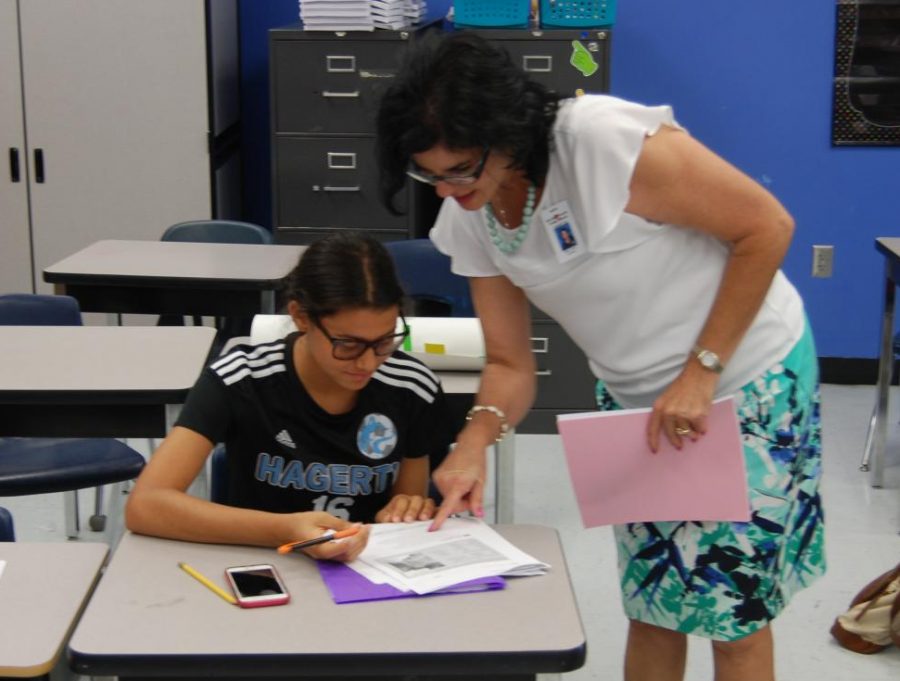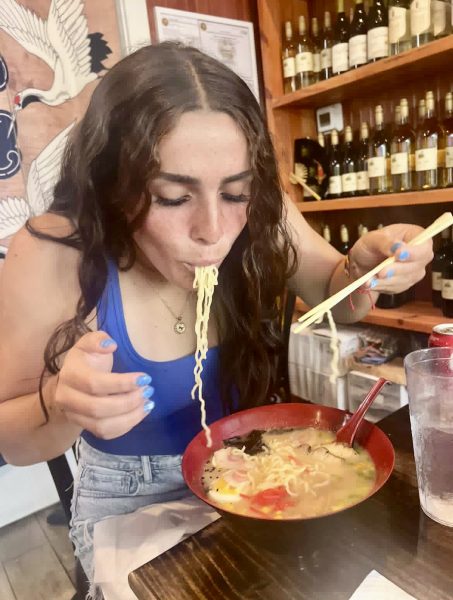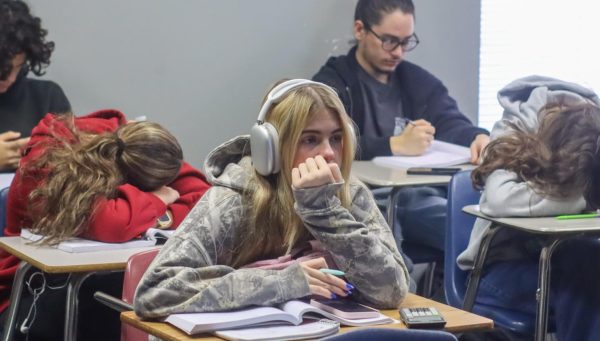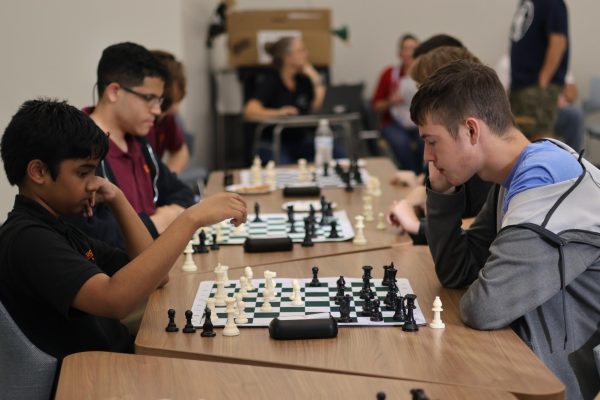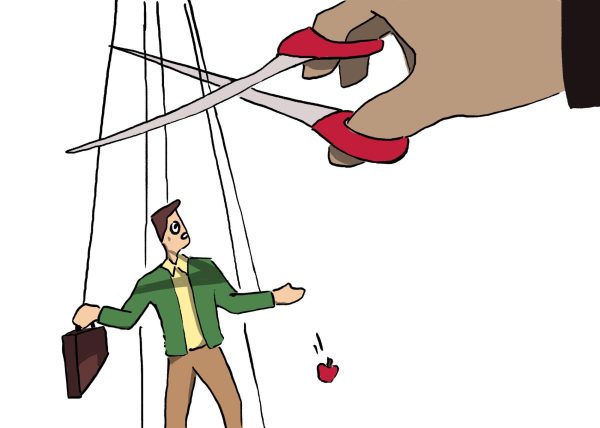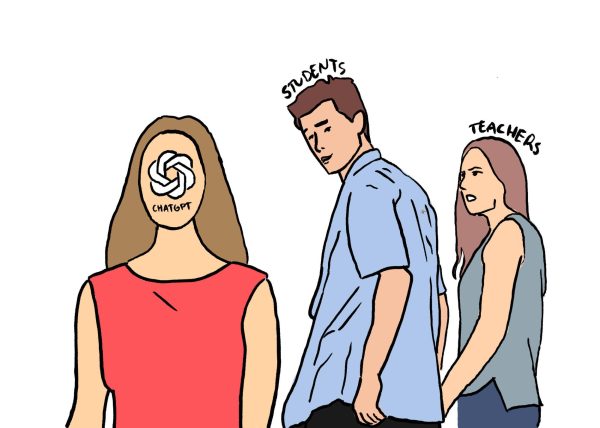Storm surge
Transfer students from Puerto Rico deal with life after Hurricane Maria
photo by Michael Gibson
Junior Claudia Montes works on spanish assignment with spanish teacher Nitza Ariza. Montes has adapted to the change by joining clubs such as Key Club.
After Maria hit Puerto Rico as a category 4 hurricane, junior Rodrigo Alamo was stuck in a neighborhood filled with fallen light poles and debris in his hometown Aguadilla. Even after Maria’s landfall, things were going okay for Alamo since unlike most Puerto Ricans, his family had a generator. However, after a few days, the generator started failing, and without resources or power and a flooded house, Alamo and his family knew their only option was to move out of the island.
Since his mom works alongside U.S. Customs, a flight was offered to Alamo’s family and they were forced to choose between moving to the United States or to stay in Puerto Rico. Feeling like there was no other option, Alamo and his family decided that it was best for them to move to Florida, arriving in late September.
“It sucked because I did not have any time to say goodbye to my family or my friends,” Alamo said. “It was something I had to do for myself, I just had to get out.”
Like Alamo, juniors Alannis Algarin and Claudia Montes were also was forced to leave family and friends without saying goodbye due to the hurricane. All three families plan on going back to Puerto Rico to visit during the summer. Algarin will visit her grandmother and Montes, her father, who both stayed in Puerto Rico because of their jobs.
“Living without him has been weird because we are not used to being apart from each other,” Montes said.
Both Algarin and Montes, who lived in the countryside of Puerto Rico in Carolina, witnessed their neighborhood get destroyed, leaving no trees and covering the entire area with mud.
“I found out I had neighbors uphill I did not know I had since all the trees were gone,” Algarin said.
Seeing the extended damage, Algarin’s mom decided it was best for them to leave the island. At first, the plan was not to leave Puerto Rico permanently, however, after her mom talked to family and friends, she decided that moving to Florida was their best option.
For Algarin’s best friend, Montes, the reason why her family decided to move had to do more with the resources than the living conditions. Since basic necessities were hard to find, and food as well as water were contaminated because of the damage, Montes, her brother and mom decided to move out of Carolina.
Forced to leave Puerto Rico because of the conditions, Alamo, Algarin and Montes have struggled during the transferring process. The first week, Algarin and Alamos had to stay in relatives’ houses and hotels while their family looked for an apartment.
After settling, Algarin and Montes’ families had problems with transportation since they could not bring their cars with them. This caused Montes’ mom to rent one temporarily until their cars get shipped from Puerto Rico.
“My mom has been frustrated about how to get around,” Algarin said.
Starting school in the middle of the first semester has been another struggle for all three. For Montes and Alamos, their biggest struggle has been to get a sense of how things work when it comes to making friends and getting involved. However, for Algarin, altering her daily routine has been the hardest change.
“I’m not used to coming back to the apartment, [doing] homework and [being] done for the day,” Algarin said. “Back home I used to be in different clubs, dance and hang out with my friends. It’s all so different now.”
Back in Puerto Rico, Algarin and Montes attended the same school. Since it was private, the school had a low number of students and classes had a maximum of 16 students. But, now in a public school, Algarin and Montes have new electives, move classrooms and deal with more students in one class.
Alamo has adjusted better since he has moved twice before and used to attend a public school in Puerto Rico. Even though Alamo and his family had to use a GPS to get around for the first couple of weeks, they adapted to the change quickly.
“Honestly, it already feels like we never even left Puerto Rico,” Alamo said. “It feels like we have been here the entire time.”
Though the change has been different for each, all maintain a positive attitude. Both Algarin and Alamo see it as a new opportunity to succeed. They the change as a sacrifice they had to make in order to their future better.
“I did not want to move at first,” Alamo said. “But looking long-term, it was the best decision I could have made for my future and my well-being.”
Your donation will support the student journalists of Hagerty High School. Your contribution helps us publish six issues of the BluePrint and cover our annual website hosting costs. Thank you so much!

